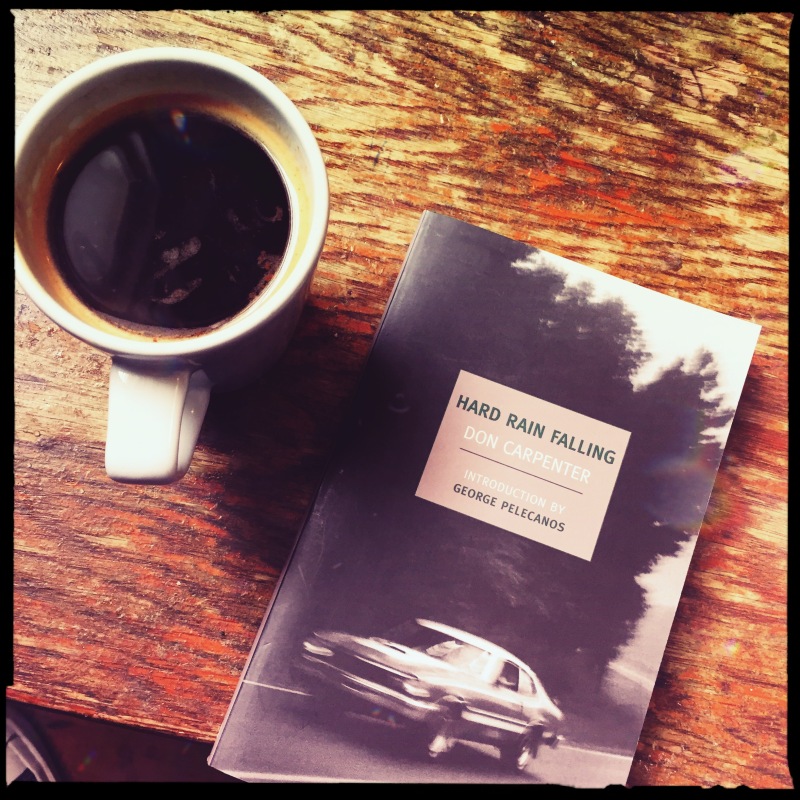The process of re-reading can be a strange one, I think. Personally I have never been one for doing much of it. There is always something ‘new’ to move onto, after all, and a book requires so much more time and attention than a record, say, or even a film. Both of those media reward our focus of course, but they seldom require immediate investment of more than a couple of hours at a time. Indeed the best long-player records can be over in a half hour. A film, an hour on top of that. A book though? A detective novel? Four of five hours maybe, and that spread over the space of days, weeks, depending on circumstances. I know some people take months to finish a book and that is fine because everyone’s lives and demands are different, but I struggle to remember what’s going on beyond three or four days. Occasionally I’ll manage a book in a single sitting but that is much rarer than it used to be and is surely as reliable a measurement of age as anything else.
I know too that many people have books they return to on a fairly regular basis. They are something of a comfort blanket perhaps. Familiarity with the magic of their prose, or with the resolution of their narratives lends a certain solace maybe. It never ceases to amaze me the number of times people can read Jane Austen, for example. I have tried reading her books and been defeated each time. I think the reasons are to do with the structure of the writing, but I am not intellectually informed enough on those things to be certain. Maybe one day it will click and make sense in much the same way Bruce Springsteen’s records did, though I admit my saying this is largely an excuse to put Springsteen and Austen in the same sentence.
Forcing myself to re-read books for this project then has been interesting. Mostly I realise how little I remember.
I do know however that it was 2003 when I was feverishly picking up and reading as much by Ross Macdonald as I possibly could because an old train ticket fell out of a copy of ‘Black Money’. It is one of those great Black Lizard ‘crime classics’ paperback editions with very period 1990s graphic design. The pages are now yellowed but it looks terrific in a photograph with a morning coffee, which is one of my ongoing projects, or habits or whatever. The photographs I mean, not the coffee, although of course it is both.

I’ll get back to Ross Macdonald eventually, I promise, but for now let me go off an on tangent and say that the photographs of beverages and books started in 2015 and that the first picture I made was of Joseph Hansen’s great ‘Fadeout’ alongside a coffee in a mug from The Romney Hythe and Dymchurch Railway. Hansen’s short series of novels featuring his detective Dave Brandstetter are well worth seeking out. He’s celebrated mostly these days as being the first openly gay detective character, and that is to be applauded of course. There is certainly a degree of Hansen reclaiming the whole queer identity and reframing the language in positive ways within the books, but they are also just really well crafted detective stories that maybe help shine a light on the strange strained suffusion of homoerotic sexual tensions that exist in much of the hard boiled stuff. All those manly figures showing off their toughness to each other. Psychiatrists would have a field day.
Another of my early beverage and book photographs was made in the Boston Tea Party cafe in Exeter. I recognise the table grain and one of their big white mugs holding a black coffee. The book is Don Carpenter’s ‘Hard Rain Falling’, one of those really nice New York Review Of Books paperbacks with a terrific cover photograph by Ken Light. It’s not a detective novel, but it is a story of crime and punishment and redemption of sorts. Carpenter is Dostoyevsky if he’d been around in the Beat Generation. His fans include Jonathan Lethem, Anne Lamont and Richard Price, who all supply effusive copy for the back cover. There’s an introduction too by George Pelecanos, which is naturally worth reading.
Pelecanos should be given a lot of credit here because, when I think about it, he was maybe my line (back) into detective fiction when the Serpent’s Tail imprint published his trilogy of Nick Stefanos mysteries in 1998. That late 1990s period was a pretty hectic time for me. I’d been teaching art in a Devon high school for six years by 1998 but still somehow found the time to be writing pretty much non stop about music and books. By 1998 too the Tangents.co.uk website would have been running for a couple of years, growing as it did out of a decade or more of fanzine writing and publishing. I’m fairly certain I had blagged review copies of other books from Serpent’s Tail and that they sent me the Pelecanos trilogy as part of their regular publicity mail out. I’m glad they did because really those books hit me like a freight train. Something about elements coming together serendipitously at the same time, maybe, but Pelecanos seemed like a voice that connected. The intensity of his prose in those Stefanos books still prickles with the energy of the DC Hardcore punk bands he’d maybe have been seeing in his formative years. The Pop cultural references effortlessly root the stories to place and time but crucially never feel forced. That’s much more difficult than it sounds.

In his later books there is perhaps a sense of Pelecanos getting sidetracked by Issues based narrative arcs, but I would say his attempts to address more serious, grown up topics like political corruption never feel as lightly done as, say, Chandler managed. That can be taken as a criticism or as praise though, so take your pick. Throughout though Pelecanos has never lost his talent for capturing speech, being as skilled in that area as any of the tough school predecessors or indeed his contemporaries. He neatly continues the hard boiled predilection for detective characters who are tough yet sensitive, soft yet strong, maybe much like Pelecanos himself. That was certainly the feeling I got when I interviewed him at the tiny Nantos Hotel, a Greek place in London where he was doing some publicity back in 1998 to promote the his just published ‘The Sweet Forever’. At the time I was doing this thing on Tangents called ‘Mass Observation’ which was a bunch of questions split in two sections, one for the present day and one for when people were 16 years old. This conceit was all tied up in the notion that 16, or at least the conceptual age of 16 is when we are ‘born’, pop-culturally speaking. It’s a flawed conceit of course, but I mostly stand by it. Anyway, the opening questions went like this:
“Where are you?”
“Nantos hotel, London.”
“What are you?”
“A Greek American writer.”
And then the third question, which was intended as one about the creative output, and couched in British English colloquialism: “What do you make?”
“What do I MAKE?”. I thought Pelecanos was going to hit me. End of interview right there. Of course he naturally interpreted this from an American perspective and assumed I was being outrageously nosey about his income. “What do I MAKE?…” In the astonished pause, I quickly realised how he had taken the question and I just as quickly filled the pause with an explanation of the intention. Thankfully he laughed and went with it. “Books” was the blunt and pretty obvious answer, the unspoken part being, did I really have to ask?
Perhaps unsurprisingly that session with Pelecanos was the start and pretty much the end of my foray into the realm of the journalistic interview. Teaching increasingly took up my time, and that was a pretty tough job, even back at the end of the 20th Century. It’s much harder now, although that’s another story, the kind of story Pelecanos would probably tell really well. In fact he kind of did, though obviously from an American perspective, in season 4 of the TV show ‘The Wire’ in which the character of Roland “Prez” Pryzbylewski takes on a job as a Math teacher in a Baltimore middle school. By season 4 Pelecanos had dialled back his involvement in the show to focus on a new book, but he still got some writing credits. I recall seeing Pelecanos’ name in the credits for the show when it screened in the UK and being so pleased because he had answered my Mass Observation question about what he wanted to be when he was 16 with “I wanted to make movies.” So ‘The Wire’ was not exactly a movie, but it was close. Maybe better.
So I think I’ve got a lot to be grateful to George Pelecanos for. He kind of scared the shit out of me, yes, but he hooked me (back) into the detective genre, so he is to thank for all of this. Or to blame. Take your pick.

Someone else who dug Pelecanos was James Sallis. His 2001 novel ‘Ghost Of A Flea’ is the sixth and final instalment of a tremendous series featuring detective Lew Griffin and at one point Griffin is to be found “reading a novel set in Washington by some guy with a Greek name”. Elsewhere in the book Sallis drops references to the Rebel Inc imprint which was so enormously important back at the turn of the 20th to 21st Centuries with its reprints of such essentials as John Fante, Jim Dodge’s ‘Stone Junction’, and Emmett Grogan’s mighty ‘Ringolevio’. Sallis describes it as ‘a new publishing house in Scotland run by a bunch of kids’. The story of Rebel Inc is fascinating in itself, with its roots in the world of fanzines and the strange literate punk energies of Edinburgh. There is a fun story of Alan Warner sending some poetry for potential inclusion in the ‘Rebel Inc’ magazine back in the 1990s, and signing it all as being by/from Morvern Callar (Warner was still writing the novel of the same name at the time). Publisher of the ‘Rebel Inc’ ‘zine Kevin Williamson however recognised the handwriting on the envelope as being Warner’s. He says that “Warner probably thinks I’ve forgotten but I don’t forget anything like that. I remember everything.”
Lew Griffin remembers everything too. He’s forever bringing up quotations and peppering them through his books. Lots of philosophy, Emerson in particular. And of course I say Lew Griffin when I really mean James Sallis. It’s James Sallis who manages to pull up all sorts of delightful philosophical gems and he just happens to use Lew Griffin to give them voice. Such is the life of the writer. Of course Lew Griffin himself is a writer too as well as a teacher, an investigator and a drunk. Not that Sallis is all of those things, or indeed any of those things except writer, although perhaps somewhere inside we are all of us all of those things at some point in our lives, to a greater or lesser degree, with more or less adherence to dictionary definitions. Anyway, to coin a phrase some of my Tangents writer friends and I used a lot, James Sallis writes like God.
But only sometimes. I once read his spy thriller ‘Death Will Have Your Eyes’, and it was not that great. But the Lew Griffin novels, now that’s another matter. Of course all the greatest Noir has always at core been about Identity, and this is probably why Sartre and Camus were such fans. Sallis understands this implicitly, and the Lew Griffin novels are notably as much about identity and spirit as they are about crime. Indeed, in ‘Ghost Of A Flea’ and to a lesser extent in ‘Bluebottle’, crime barely comes into it, the books being much more about the nature of exploration or, if you will, investigation; looking for clues as to who and why we are what we are as much as to solve any misdemeanour. Perhaps also the only misdemeanour is our very existence on this Earth, but maybe that’s getting altogether too maudlin and end-of-the-world weary.
Sallis writes as much as anything about the splendour of books, and the splendour of life and people. He writes about the search for meaning in words and in faces, gestures, touches, kisses, words shared, exchanges… all of this thrown up and examined and found both life-affirming and wanting at the same time. Of course all great Noir is essentially existential, and Sallis writes the poetry of the weary existential outsider with a sparkling mix of the coolest prose in the warmest of lonely hearts. His books still feel special.
